Winter Olympics 2022: True cost of Jackie Narracott’s historic sliding silver medal
Newly-minted silver medallist Jackie Narracott has revealed her winning formula: fall in love with another competitor and pick his brains, and then max out the credit cards.
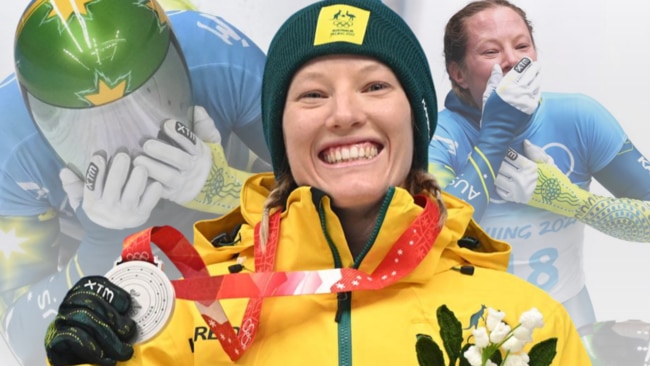
Winter Olympics
Don't miss out on the headlines from Winter Olympics. Followed categories will be added to My News.
Jackie Narracott’s winning formula was simple: fall in love with another competitor and pick his brains, and then max out the credit cards.
Narracott’s astounding silver medal effort in the death-defying skeleton at the Beijing Olympics, in a sport foreign to the Australian sporting scene, was eight years in the making.
She would beg and borrow on the world cup tour: obtaining video assistance from the Danes, training on the South Korean track for a few months, looking to the Canadians for medical support for serious concussion when she suffered a near career ending crash in late 2018 and trained on the British track.
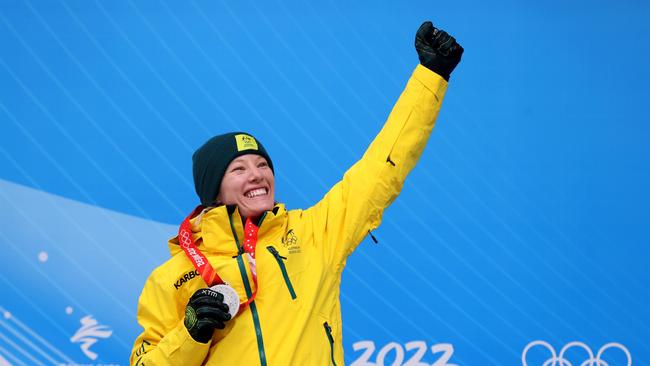
Australia, through the Olympic Winter Institute of Australia would help out with co-ordinating some of the assistance with other teams but Narracott was never considered a top contender. The official funding for a sliding program ended at the PyeongChang Olympics, but Narracott still believed.
“I borrowed from the bank of mum and dad,’’ she said, calculating that the silver medal around her neck has cost her and the family well in excess of $100,000.
Before PyeongChang, Narracott received nothing, but in the past four years there has been some small support: $20,000 a year from the Olympic Winter Institute of Australia and some ad hoc payments from Bobsleigh and Skeleton Australia such as a $5000 Beijing Olympic preparation grant. Now, having won a medal she is eligible for a $15,000 medal incentive payment from the Australian Olympic Committee (which also funds Bobsleigh and Skeleton Australia with $100,000 a year because it gets no money from the Federal government), but she is unsure if she will continue.
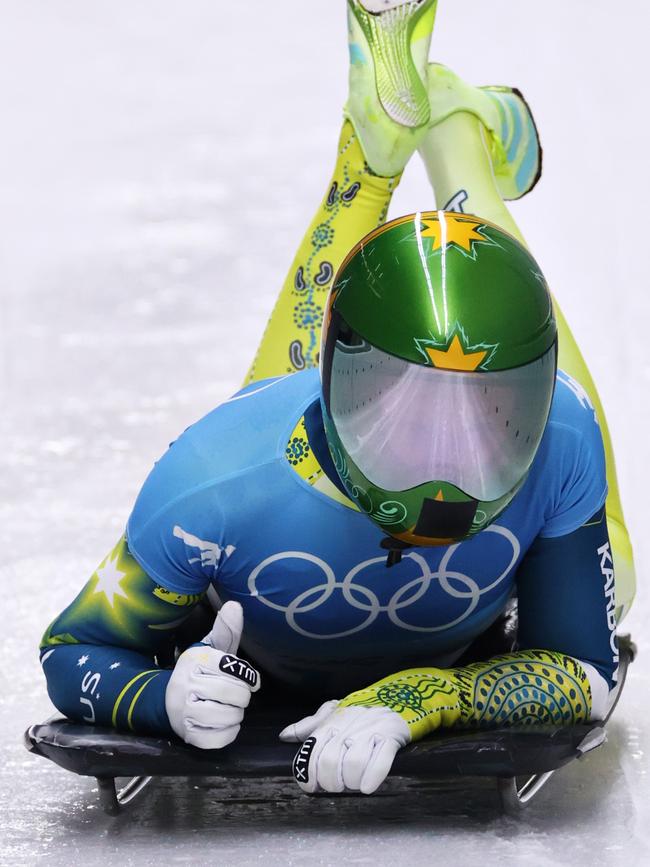
The big difference, Narracott believes, was meeting her husband Dom Parsons, the PyeongChang skeleton bronze medallist from Britain back in 2014.
Parsons, a quietly spoken Englishman, told The Australian that he knew he wanted to propose to Narracott before the 2018 Olympics because “she is someone I can fully trust and there is never a moment where we don’t feel entirely comfortable with each other”. But he didn’t want to distract from her initial Olympic effort, buying the ring a few months after the South Korean Games. That was when Narracott banged her head on the Whistler sliding track, but Parsons laughs: “her yes to me was not concussion-related”. The couple married in 2019 and they set up home three hours west of London where there was a sliding push track at the University of Bath.
Over the past three years Narracott continued on the world cup circuit and would send the training videos to Parsons, an engineer with former skeleton slider Kristan Bromley, who designs sleds to analysise and advise.
She would call Parsons each evening and he would review her day’s training at whatever track she was around the world. For several months during the pandemic it was South Korea, other times in Canada, but when the Canadians lost some funding, she switched to Europe.
But the 31 year old said the biggest change came when Parsons was in person with her reviewing the track. He can visualize it in 3d form, wherease she can only feel it.
“We would chat at night reviewing the video from training on the road but it is having him by my side that has been great,’’she said.
The Olympic track, nicknamed the Dragon, is similar to the St Moritz track because it is freshly carved and few have any experience on it.
Parsons and Narracott minutely studied the Yanqing track, the thickness of the ice, the curvature, the banking, the little bobbles and the problem points.
“Our Olympic approach was similar to St Moritz because you have to figure it out. It is handmade from the snow and ice and you have know every bit of the track. You only have four runs so you have to be familiar with it. And the plan we went with was not that she had to put down a blisteringly fast run, but she had to put down four good runs. That was a big challenge on this track to get that consistency,’’ said Parsons.
Narracott’s Olympic strategy was to concentrate on getting back into line quickly, rather than sliding on a knife-edge.
She also said there was a switch in her mindset a few months ago.
Narracott revealed: “I finally let go of the need to medal. I finally realised my career was not going to be any worse or any better… so like, oh man, it happened. There has always been that belief but to actually get the concrete evidence in front of me and for everybody else is huge.’’
Narracott said she surprised herself at the Olympics “a little bit’’, adding “the whole field is ridiculously tight, so to medal in that field is unbelievable. There were ten of us who could have taken any of those three positions.’’
Parsons said Narracott had refused to give up, and he admired her determination and resilience. She has been wanting this for so long she has just got this determination, he said proudly, admitting that he was more thrilled for his wife to win a medal than he was for his own achievements.
“By the time we got to race day she’d managed to find confidence in herself that whatever she came up against down the track she could deal with,’’ he said.
“The biggest part was that she had that relaxation and flow down the track. Even when bits weren’t ideal she still flowed with it.”
Narracott is now heading back to Queensland for the first time in two years, to see family and enjoy some sunshine. Once again, the couple will be briefly separated, for Parsons has to head back to work in Britain.
Aussie nails our first sliding medal
- Julian Linden
Move over Steven Bradbury, another Aussie battler has just delivered a miracle on ice.
Defying incredible odds, Jackie Narracott has won silver at Beijing in one of the fastest and most dangerous sports at the Winter Olympics.
The Queenslander finished second in the women’s skeleton with a performance that was as brilliant as it was unexpected in the terrifying head-first sledding sport.
Leading the field by just 0.21 seconds after Friday’s first two rounds, the 31-year-old from Brisbane somehow managed to keep her cool under the suffocating pressure of the Olympics to get on the medal podium.
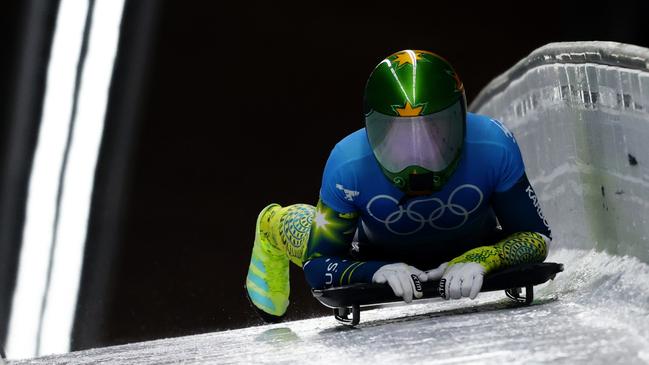
“It’s still so surreal,” Narracott said.
“I just stayed in the moment, being calm and having fun. Everything just clicked.
“That’s the most relaxed I’ve felt on the sled, probably my whole career.
“I had nothing to lose. I knew that if I was just relaxed, and feel what I’ve been doing for the last three months, it would be OK.
“It was absolute elation. A little bit of disbelief.
“Words can’t describe it. We’ve never won a sliding sport medal, so for me to be it... Creating your dream twice in two races, it doesn’t get any better.
“The medal is a childhood dream come true, and then from a sliding point of view to be the first, we had some pretty good girls ahead of me which, without them, I wouldn’t be here. To be the first is pretty cool.
“It makes all the tears and all the questioning and all the hard work away from family absolutely worth it.
“I’m hoping it might get some more girls back into skeleton. We used to have a programme, so to have some more back in and for it not to end with me would be absolutely unreal.”

With all four times added together, Narracott slayed the twisting icy course nicknamed “The Dragon” to set a new track record in her third run.
But Germany’s Hannah Neise went even faster, by a blink of an eye, and extended her advantage in the last run to clinch the gold by just 0.62 from Narracott.
Narracott’s amazing triumph lifted Australia’s medal tally in China to four — setting a new record for Australia at any Winter Olympics after Jakara Anthony (gold), Scotty James (silver) and Tess Coady (bronze) all won medals earlier in the week.
Of all the medals won by Aussies in Beijing, Narracott’s silver was by far the most unexpected but that only made it sweeter.
“It’s a remarkable sporting achievement,” the Australian team chef de mission Geoff Lipshut said.
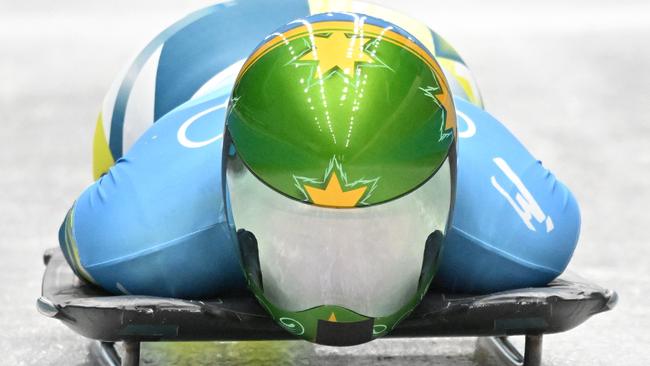
“It’s about an individual’s incredible journey of belief in what they’re doing and turning into the most fabulous outcome.”
The first Australian to win an Olympic medal in a sliding sport, Narracott’s achievement is up there with Bradbury’s fairytale win in short track speed skating at Salt Lake City two decades ago.
Like Bradbury, Narracott was forced to relocate overseas to chase her Olympic dream because there’s not a single bobsleigh, luge or skeleton track anywhere in Australia.
Like a lot of Aussies competing in sliding sports, Narracott fell into skeleton almost by accident after starting out as a sprinter, inspired by her uncle Paul Narracott, who ran for Australia at the 1984 Los Angeles Olympics, racing against Carl Lewis.
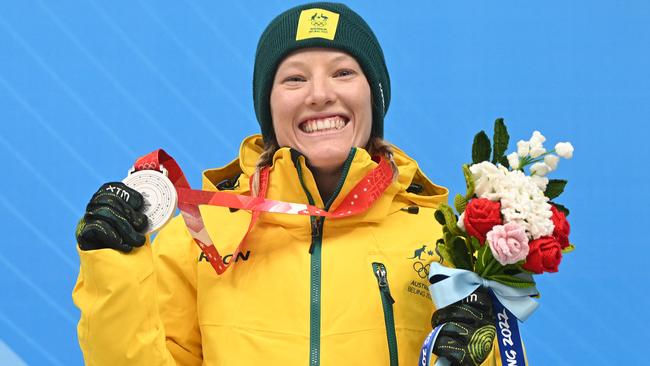
She wasn’t quite fast enough to make it as a runner but her famous uncle had shown her another way to make the Olympics on a very different track after he represented Australia in bobsleigh at the 1992 Albertville Winter Olympics.
“I’m thrilled. Absolutely thrilled for Roger and Cheryl. Obviously for Jaclyn, wasn’t she fantastic?” uncle Paul said.
“It’s difficult to put into words just what she’s been able to achieve. It’s just so fabulous.
“So good on her and absolutely brilliant combination that she’s got going with her husband, Dom. I think that is what’s turned the corner. I mean, four weeks ago, prior to St Moritz,
everyone was thinking, top 10 that will be fantastic and all of a sudden she wins St Moritz, confidence through the roof, and just anything’s possible and look what she’s done.
“So good on you, Jaclyn, deserved every single accolade that is coming your way. So well done.”
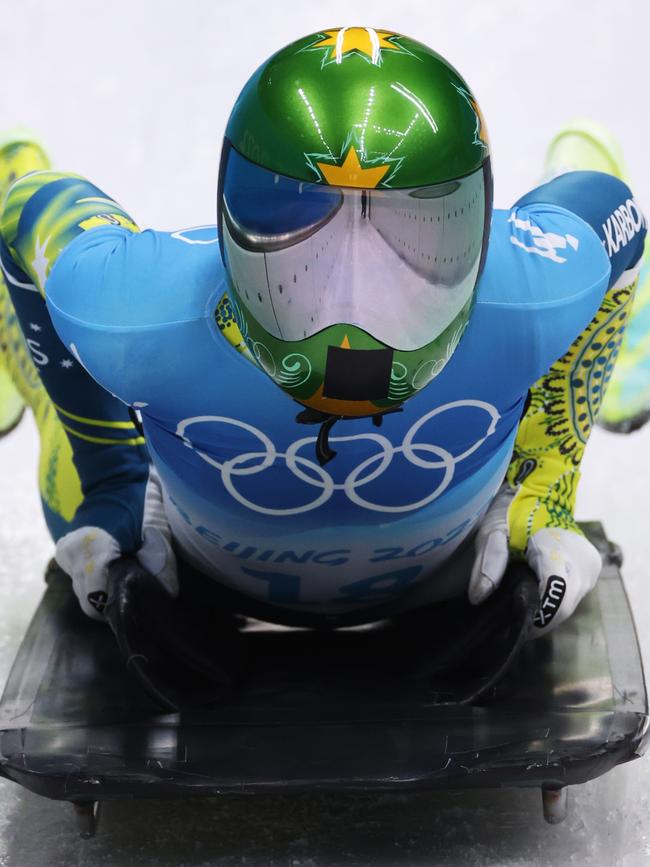
Narracott decided to give bobsleigh a go but found herself drawn to the thrill and risk of skeleton so took up the solo event in 2012, initially moving to North America to train then Britain, where she now lives with her husband Dom Parsons.
He won a bronze for Britain at the last Olympics in South Korea, where Narracott also made her Olympic debut, but success has been slow in coming for the Aussie.
She finished 15th in PyeongChang and until last month, she had never placed higher than seventh in any World Cup meet.
Then suddenly, after years battling away in the middle of the pack, everything clicked into place at the perfect time.
She won last month’s prestigious World Cup race in St Moritz, the spiritual home of skeleton, breaking the track record to emerge as a bolter for Beijing.
Reinvigorated by her breakthrough wins, Narracott came to China believing anything was possible but was still regarded as a long shot for a medal.
“It’s remarkable, it’s just incredible,” Lipshut said.
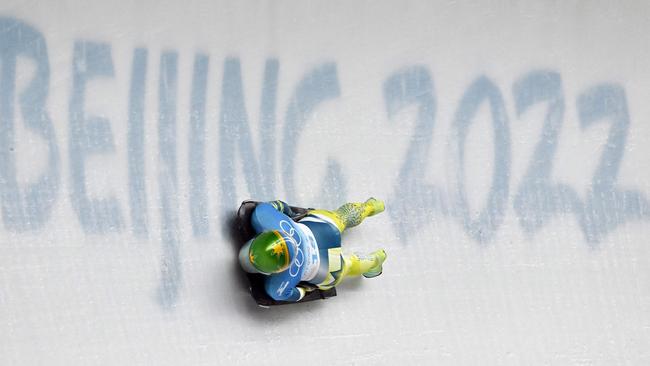
Concussion real in Aussie’s headlong pursuit of gold
Australia’s Jackie Narracott has revealed her secrets — and worst fears — before she goes for gold at the Beijing Winter Olympics.
The Queenslander has already stunned the winter sports world by snatching the overall lead in the women’s skeleton after the first two rounds in China.
The final two rounds are still to come but the 31-year-old has a great shot at becoming the first Aussie slider to win an Olympic medal if she can hold it together at the icy track that’s been nicknamed “the Dragon”.
In an exclusive interview with News Corp, Narracott has provided an unique insight into what she needs to do to win, but also the serious dangers she faces in the terrifying headfirst sledding sport.
“The perfect run needs a fast and powerful start to begin with,” she said.
“Then it needs to be super smooth all the way down the track.
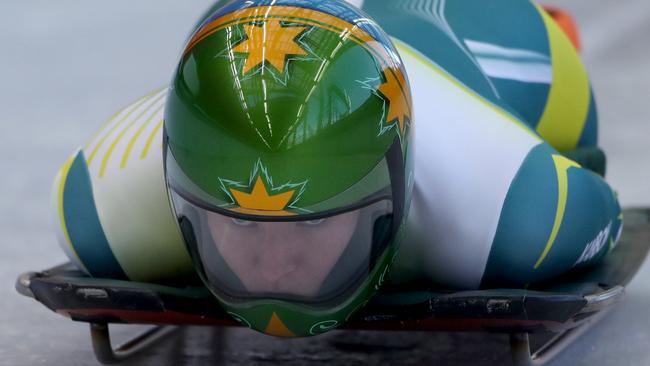
“If it looks like we’ve done nothing, that’s perfect.
“For the most part, it’s fun for me but the heart in mouth moments come on really bumpy tracks.
“I’ve got a history of concussion. The really super bumpy tracks just hurt my head. So that’s when I get a little bit worried.
“I’ve had three concussions now but thankfully I have never lost consciousness, the last one was pretty bad that ended up being post-concussion syndrome.
“A lot of it is the micro vibrations. That’s what tends to get us.
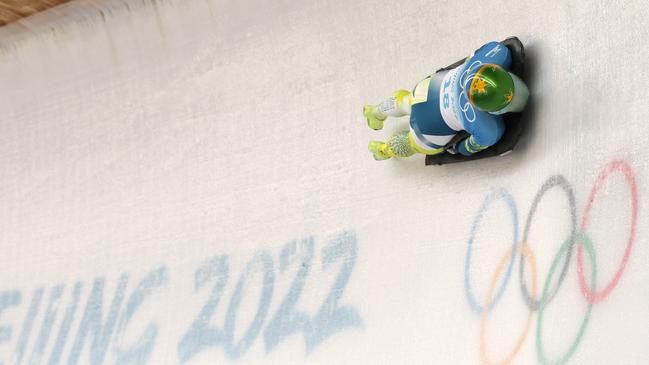
“As a sport, we’re getting better at managing it, and we’re getting better at accepting the fact that someone says, my head hurts or I feel dizzy that the next response is, ‘OK, sit this one out’ Not ‘harden up.’
With the times from all four runs added together to decide the medals, Narracott has a narrow advantage going into the third run, which will involve 20 riders.
The German pair of Hannah Neise and Tina Hermann are just 0.21 seconds and 0.23 behind with the top 11 within a second of the Australian.
He beat Scotty James but Hirano wants answers over ‘travesty’
The Japanese snowboarder who beat Australia’s Scotty James to win the halfpipe gold at the Beijing Winter Olympics has slammed the judges who marked him down after he put his life “on the line” to complete the most dangerous trick in the sport.
Still fuming a day after he won the gold medal, Ayumu Hirano has now called for a review into the controversial judging that almost cost him the Olympic title.
Hirano overtook James to win the gold on his final jump when he nailed a triple cork. but the Japanese star – and plenty of neutrals – believe he should never have had to put himself at risk again because he had already done the trick on his second run.
That was a history-making moment because no snowboarder had ever pulled it off in competition before, but, to the amazement of everyone watching, the judges gave him less marks than James, whose second run was technically very impressive, but did not include the dangerous triple cork.
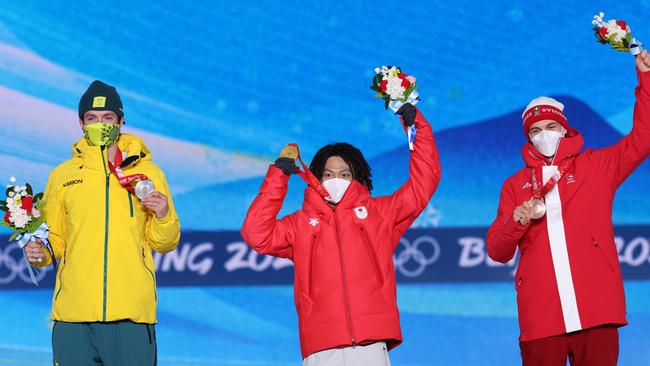
American snowboarding legend Todd Richards, commentating for NBC, blew a fuse when Hirano receives lower marks than the Australian.
“As far as I’m concerned, the judges just grenade’d all of their credibility,” he growled.
“That run, I’ve been doing this for so long. So long. I know what a good run looks like. I know the ingredients of a winning run. I know when I see the best run that’s ever been done in the halfpipe.
“Try to tell me where you’re deducting from this run? It’s unbelievable that this is even happening. It’s a travesty, to be completely honest with you. I am irate right now.”
It didn’t matter in the end because Hirano clinched the gold, when he put his neck on the line again and nailed the trick one more time in his third and final run, while James did not attempt it.
But Hirano, who won the silver medal at the last two Winter Olympics before representing Japan in skateboarding at the Tokyo Summer Games, said he still wants answers as to why the judges marked him down in the first place.
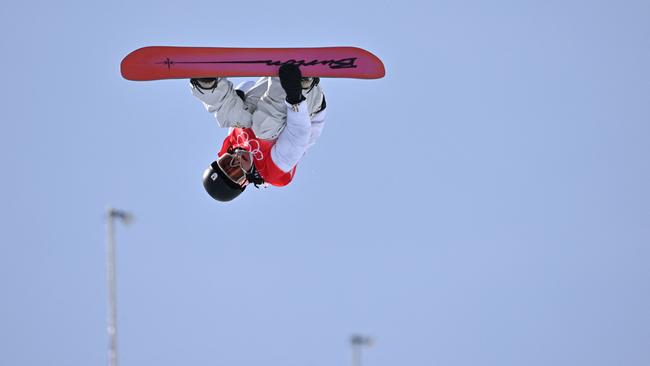
“I think we should look into exactly what the judges were looking at,” he said.
“For the athletes, they’re putting their lives on the line, they’re giving it their all. So for the riders, I think some steps need to be taken to address this issue regarding the judges. So perhaps we shouldn’t just ignore this matter.
“There’s a lot of freedom – that’s what makes snowboarding attractive – but we are competing. The wow-factor, how you can touch people through your performance, that’s important too.
“But at the Games, in terms of the amplitude, the grabs, we need to measure those accurately and assess those and score those accurately.
“There has to be a more robust system in place for that and in terms of the judges’ assessment. I do feel it’s not established yet, it’s not quite sound.
“When the athletes take on a huge risk performing a trick, perhaps they can reflect that risk-taking more in the scoring. There might need to be a different system in place to reflect all those elements in the scoring.”
Aussie star cleared of injury after scary snowboard incident
Snowboarder Belle Brockhoff has been cleared of any injury and has returned to the Olympic athletes village. Australian officials confirmed the initial diagnosis of no serious issues after the MRI and CT scan were both clear. Australian oly officials said: “CT & MRI all clear, Belle is out of the neck collar and heading back to the Athletes Village shortly.”
Earlier, Brockhoff was taken to a Chinese hospital with a sore neck after crashing awkwardly during the snowboard cross teams event at the Beijing Olympics.
Australian officials said Brockhoff, 29, has been taken to hospital for imaging and more details should be known soon.
Brockhoff was taken from the course in a stretcher which delayed the running of the event for more than 15 minutes. She fell three quarters of the way down the Genting Snow Park run after running into the heat leader. Her partner in the event Cameron Bolton said he believed Brockhoff was fine, but that officials were being cautious.
Brockhoff’s fall came just seconds after the other Australian rider, Josie Baff had also crashed, dashing Australia’s chances in an event in Australia is the reigning world champion.
Both of the Australian teams were drawn in the same heat, which theoretically gave Australia a fifty per cent chance of getting a team through to the quarter-finals.
Brockhoff and Baff miscalculated the snowy conditions running into the rider in front although Baff claimed the ultimate winner of the event individual gold medallist, American Lindsey Jacobellis cut across her line.
“I was just kind of setting up in my line. I wasn’t really expecting Lindsey to come across as much as she did, and I wasn’t as stable. I wasn’t ready over those rollers to have any kind of impact. I wasn’t steady enough, so I just kind of fell out,’’ said Baff from Jindabyne.
“It’s devastating.
“You get one chance as well, so if you stuff up you’re gone.”
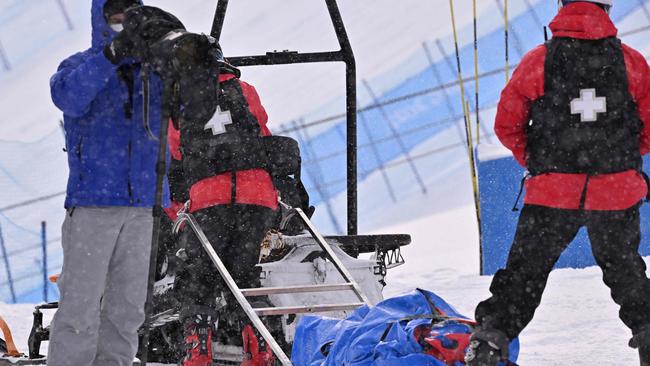
Bolton said his immediate thoughts were with Brockhoff, rather than the result.
“It’s extremely disappointing, obviously results-wise, but there’s probably bigger fish to fry at the moment and hope that Belle is OK,” Bolton said on Channel 7.
“Went down pretty hard, ski patrol around her. So, first of all I hope she’s doing well. I saw her … and heard from the team that she’s doing OK, it’s just precautionary and they think everything is good.
“Hopefully that’s the case.”
Bolton said there had been “no limits” for what he could have achieved with Brockhoff and conceded the Olympic campaign had been a disaster for Australia’s boarders.
“I don’t think the Olympics could have gone much worse for the Australian boarder/cross teams to be honest,” he said.
“Belle did well fighting for fourth, but just about everything else that could have gone wrong went wrong.”
Baff’s partner Adam Lambert defended the results of the snowboard cross team, which had been expected to bring home at least one medal.
After earlier claiming that the sport had too many variables, he insisted that the result was not a toss of the coin.
“Our sport is really hard and it’s so hard to be consistent,’’ he said.
“it’s not a toss of the coin. I mean, we’re all consistent. We’ve all been on the podium. Every result that is not a podium is a missed opportunity. It’s hard. Every athlete is their own biggest critic and we’re all feeling it.”
🚨 UPDATE:
— AUS Olympic Team (@AUSOlympicTeam) February 12, 2022
Belle Brockhoff is current being treated on the course after an awkward fall.
We will provide an update when we hear more.#ChasingWinter
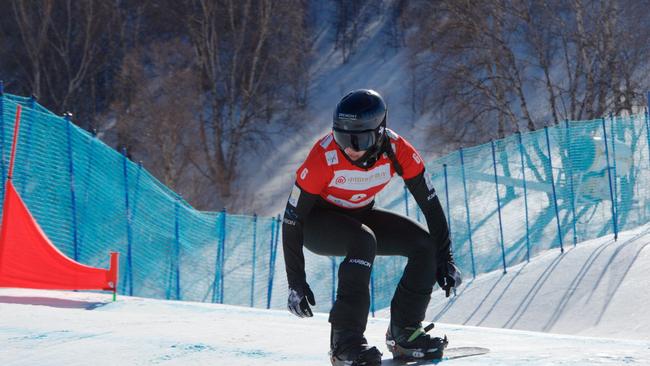
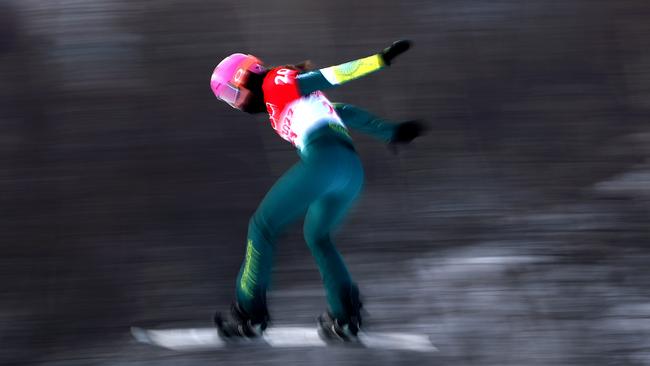
ATHLETE DEFIES BAN ON POLITICAL PROTESTS
An athlete has staged the first political protest of the Winter Olympics in Beijing, holding up a sign reading “no war in Ukraine”.
Vladyslav Heraskevych, a Ukrainian competitor in the skeleton bobsled, showed the sign briefly to television cameras after completing a run.
The words were printed on a piece of paper with the colours of the Ukrainian flag.
“It’s my position. Like any normal people, I don’t want war,” Heraskevych, 23, said after he finished competing, according to the Associated Press.
“I want peace in my country and I want peace in the world. It’s my position, so I fight for that. I fight for peace.”
ukrainian skeleton athlete Vladyslav Heraskevych held up a sign that read "no war in ukraine" after finishing a run at the olympics. pic.twitter.com/2an00J9KSy
— ian bremmer (@ianbremmer) February 11, 2022
Russia has amassed about 130,000 troops near its border with Ukraine but denies planning to invade.
Rule 50 of the Olympic charter states that “no kind of demonstration or political, religious or racial propaganda is permitted in any Olympic sites, venues or other areas”.
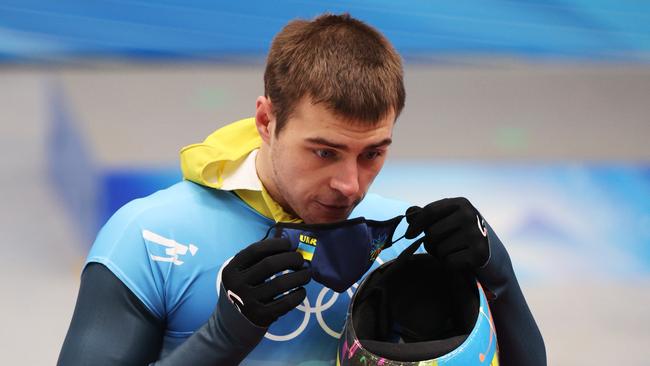
That rule was relaxed before last year’s Tokyo summer Games to allow for protests made “without disruption and with respect for competitors”.
China warned this month that protests at its Winter Olympic venues or on the medal stand could violate Chinese law as well as Olympic rules. It was largely seen as a means of intimidating athletes who might protest over the country’s mass persecution of Uighur Muslims.
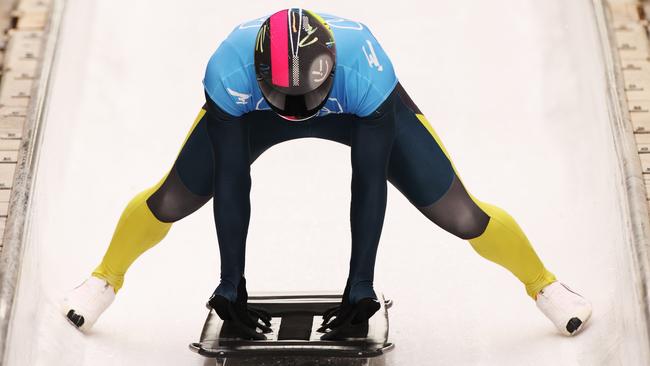
“In Ukraine it’s really nervous now,” Heraskevych said. “A lot of news about guns, about weapons, what’s to come in Ukraine, about some armies around Ukraine. It’s not OK. Not in the 21st century. So I decided, before the Olympics, that I would show my position to the world.”
This article was first published by The Times
Games drama as Russian star’s failed drugs test confirmed
Russian skating sensation Kamila Valieva failed a drugs test in December, Olympic testers confirmed, and the IOC is now appealing against Russia’s decision to allow her to continue competing in Beijing.
The 15-year-old played a starring role in helping the Russians win the figure skating team gold on Monday.
The next day, the result of a test she took during the Russian championships on December 25 was communicated to Valieva — six weeks after she gave the sample.
On Friday, soon after she was seen practising ahead of next week’s Olympics singles event, the International Testing Agency (ITA) publicly confirmed that her sample contained traces of the banned substance trimetazidine.
Trimetazidine is a metabolic agent used to treat angina and vertigo, but it is banned by the World Anti-Doping Agency (WADA) because it can increase blood flow efficiency and help endurance.
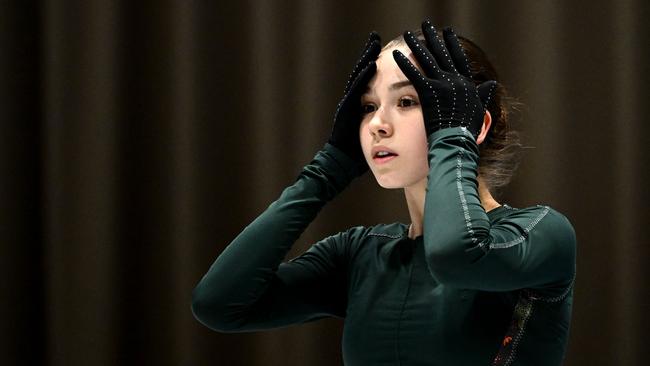
The ITA, which carries out drug testing at the Olympics, said the Russian Anti-Doping Agency (RUSADA) had suspended Valieva when it received the result but she successfully overturned the decision, enabling her to continue at the Beijing Games.
Now the International Olympic Committee, as well the International Skating Union (ISU) and WADA say they will appeal against the decision to lift her suspension.
“The IOC will exercise its right to appeal,” the ITA said.
The Court of Arbitration for Sport will hear the case and will make a decision before February 15, when the Olympic singles event starts, the ITA said.
‘Serious questions’
It is just the latest doping scandal surrounding Russian athletes in recent years at Olympic Games.
Russian competitors are taking part in Beijing as the Russian Olympic Committee (ROC) after the nation was banned because of a massive state-sponsored doping scheme at its home 2014 Sochi Olympics.
Valieva’s test was sent to a WADA-accredited laboratory in Stockholm, Sweden and questions will be asked as to why it took so long for it to be processed.
RUSADA said it had been informed that a sharp rise of Covid-19 infections at the start of the year was to blame for the delay.
“According to the data sent by the laboratory to RUSADA, the reason for the delays in the analysis and reporting by the laboratory was another wave of COVID-19,” the Russian agency said in a statement.
RUSADA also said it had launched an investigation into the teenage skater’s entourage.
The head of the Russian Olympic Committee, Stanislav Pozdnyakov, meanwhile questioned the timing of Valieva’s positive test.
“The timings of sample processing raise serious questions,” Pozdnyakov told the RIA Novosti news agency, suggesting the result had been deliberately released to coincide with the Olympics.
“It seems like someone held the sample until the end of the team skating tournament,” he added.
ROC said Valieva had the right to compete in Beijing and that her team gold medal should stand.
It said it wanted to “draw attention to the fact” that a test Valieva took during the Olympics “gave a negative result”.
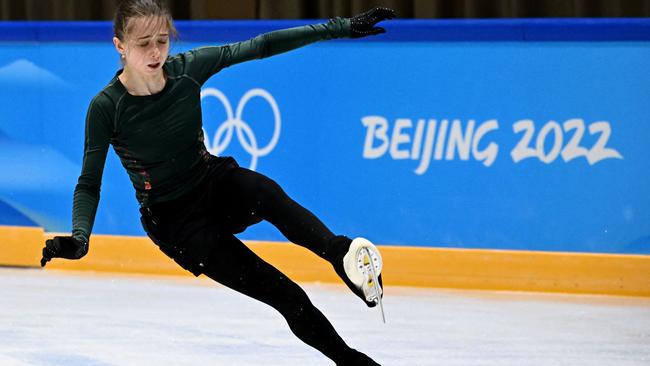
Valieva is one of the favourites to win the individual event next week. She became the first woman in history to produce a quadruple jump at an Olympics to help Russia win the team event.
She won the European championship singles title in Estonia in January as Russia swept the gold medals.
The confirmation that Valieva failed a doping test explains why the medals ceremony for the figure skating team event has not taken place.
The United States finished in silver medal position with Japan third and Canada fourth.
‘Catastrophic failure’
United States Anti-Doping Agency chief Travis Tygart questioned how it had taken nearly six weeks for Valieva’s positive sample to come to light.
“The failure to report a test taken in December until after the team event in the Games is a catastrophic failure of the system to protect the public, the integrity of the Games and clean athletes who had to compete,” Tygart told AFP.
“It shouldn’t have happened.”
IOC spokesman Mark Adams said in Beijing: “It’s very important for everyone involved, not least the 15-year-old athlete that is concerned, that we have due process, that it’s seen to be done properly and that people can have confidence in the decisions that are taken.
“We are working as fast as we can under the circumstances to get that.
“Such cases are not helpful to the Games,” he added.




